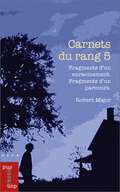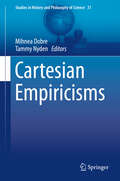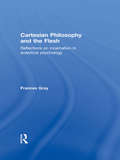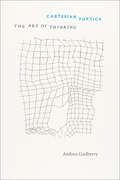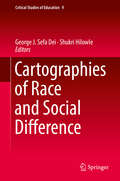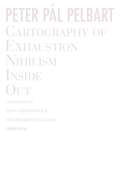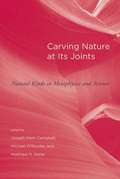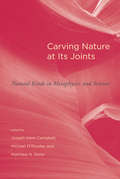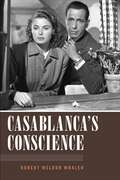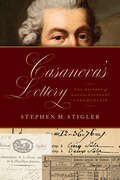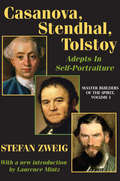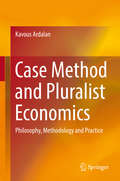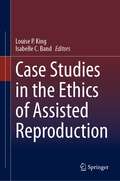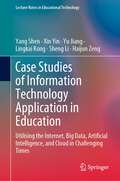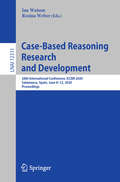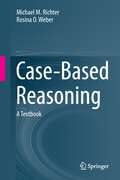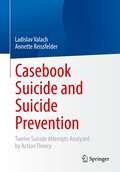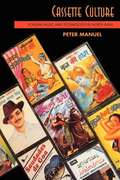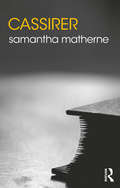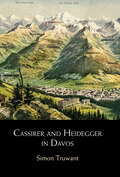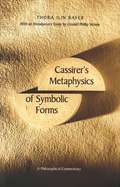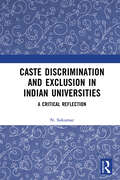- Table View
- List View
Carnets du rang 5: Fragments d’un enracinement. Fragments d’un parcours. (Essais et fiction)
by Robert MajorQue signifie prendre racine, habiter, un espace, le faire nôtre, le transformer à notre image et, en retour, devenir autre sous son influence ? En somme, que signifie devenir « habitant » ?Le terme a longtemps été péjoratif chez nous : quasi-synonyme de personne inculte, rustre, ours mal dégrossi ; le péquenaud des Français. À tort. C’est toute une aventure que celle de devenir habitant, aventure que nos aïeux ont menée à bien, de façon exemplaire, en construisant ce pays. Il n’y a pas de plus beau destin que celui d’habiter pleinement un lieu.Ce petit recueil cherche à en témoigner. L’auteur, un universitaire avec des velléités de terrien, livre quelques extraits de ses carnets qui témoignent, de manière fragmentée, d’un parcours d’enracinement (si on lui passe l’apparente contradiction de la formulation). Ce long parcours couvrant presque un demi-siècle a peut-être une valeur représentative : ainsi, il serait le témoin d’un moment, d’une époque, d’une génération.Peut-on être enraciné ? Certes, on a un parcours. Mais l’enracinement est-il possible ? Si l’on s’enracine, dans un espace, un temps, une communauté, une famille, une parentèle, c’est pour en être déraciné inévitablement, hélas, à plus ou moins brève échéance.Des traces peuvent demeurer, toutefois. Des fragments…
Cartesian Empiricisms (Studies in History and Philosophy of Science #31)
by Mihnea Dobre Tammy NydenCartesian Empiricisms considers the role Cartesians played in the acceptance of experiment in natural philosophy during the seventeenth century. It aims to correct a partial image of Cartesian philosophers as paradigmatic system builders who failed to meet challenges posed by the new science's innovative methods. Studies in this volume argue that far from being strangers to experiment, many Cartesians used and integrated it into their natural philosophies. Chapter 1 reviews the historiographies of early modern philosophy, science, and Cartesianism and their recent critiques. The first part of the volume explores various Cartesian contexts of experiment: the impact of French condemnations of Cartesian philosophy in the second half of the seventeenth century; the relation between Cartesian natural philosophy and the Parisian academies of the 1660s; the complex interplay between Cartesianism and Newtonianism in the Dutch Republic; the Cartesian influence on medical teaching at the University of Duisburg; and the challenges chemistry posed to the Cartesian theory of matter. The second part of the volume examines the work of particular Cartesians, such as Henricus Regius, Robert Desgabets, Jacques Rohault, Burchard de Volder, Antoine Le Grand, and Balthasar Bekker. Together these studies counter scientific revolution narratives that take rationalism and empiricism to be two mutually exclusive epistemological and methodological paradigms. The volume is thus a helpful instrument for anyone interested both in the histories of early modern philosophy and science, as well as for scholars interested in new evaluations of the historiographical tools that framed our traditional narratives.
Cartesian Philosophy and the Flesh: Reflections on incarnation in analytical psychology
by Frances GrayHow do you know anything is true? What relation is there between my psyche and your psyche, does one exist? Can we doubt everything or are some things indubitable? What does Jung have to say about body and psyche, body and mind? Cartesian Philosophy and the Flesh is an analysis and critique of interpretations of Cartesian philosophy in analytical psychology. It focuses on readings of Descartes that have important implications for understanding Jung, and analytical and existential psychology generally. Frances Gray's book raises questions about the 'place' of the body in a theory of the human psyche and about what kind of psyche, if any, is essential to concepts of human being. Gray claims that the debates around Descartes and metaphysical dualism have been oversimplified and that this has had a profound effect on conceptualizing an on-going relation between psyche and body. The book also explores the relationship between Jung's conception of the phenomenological standpoint and that of Edmund Husserl and Maurice Merleau-Ponty. Cartesian Philosophy and Flesh brings together Descartes’ idea of self-interrogation and self-reflection and Jung's project in The Red Book, the practice of spiritual exercises is the underpinning orientation of both men. It recommends similar practices to anyone interested in the truths of their own living. Gray’s book will be of interest to Jung scholars, and those with an interest in Jungian studies, Analytical Psychologists and Philosophers.
Cartesian Poetics: The Art of Thinking (Thinking Literature)
by Andrea GadberryWhat is thinking? What does it feel like? What is it good for? Andrea Gadberry looks for answers to these questions in the philosophy of René Descartes and finds them in the philosopher’s implicit poetics. Gadberry argues that Descartes’s thought was crucially enabled by poetry and shows how markers of poetic genres from love lyric and elegy to the puzzling forms of the riddle and the anagram betray an impassioned negotiation with the difficulties of thought and its limits. Where others have seen Cartesian philosophy as a triumph of reason, Gadberry reveals that the philosopher accused of having “slashed poetry’s throat” instead enlisted poetic form to contain thought’s frustrations. Gadberry’s approach to seventeenth-century writings poses questions urgent for the twenty-first. Bringing literature and philosophy into rich dialogue, Gadberry centers close reading as a method uniquely equipped to manage skepticism, tolerate critical ambivalence, and detect feeling in philosophy. Helping us read classic moments of philosophical argumentation in a new light, this elegant study also expands outward to redefine thinking in light of its poetic formations.
Cartographies of Race and Social Difference (Critical Studies of Education #9)
by George J. Sefa Dei Shukri HilowleThis book critically examines how race is constructed globally to intersect gender, class, sexuality, language ability and religion and answers some very important questions, like how does anti-black racism manifest itself within various contexts? Chapters in the book use the ‘Black and White paradigm’ as a lens for critical race analysis examining how, for example, the saliency of race and Blackness shape the ‘post-colony’, as well as the various ‘post’ colonial nations. The paradigm centers Whiteness as the lens of defining what and what is different. The negative portrayal of difference is anchored in the sanctity of Whiteness. It is through such analysis that we can understand how historically colour has been a permanent marker of differentiation even though it has not been the only one. It is through conversations and dialogue in the classroom that the book was created; given the current political shift in American and the rise of Anti-Blackness, anti-Indigeneity, Islamophobia and xenophobia. The book critically examines White supremacy, racialization of gender, “post-racial” false narratives, and other contemporary issues surrounding race.
Cartography of Exhaustion: Nihilism Inside Out (Univocal)
by Peter Pál PelbartIn our current landscape of communicative and connective excess, a very novel contemporary exhaustion exacerbated by our relation to the postdigital terrain is ever present. The Brazilian philosopher and schizoanalyst Peter Pál Pelbart pushes the vital question of our nihililstic age to the limits: how can one learn to be left alone, live alone, and perhaps, by way of a Deleuzian &“absolute solitude,&” conjure a vitality for living again and, indeed, finding something truly &“worthy of saying&”? Through various poetic meanderings and meditations and building on the works of Blanchot, Musil, Guattari, and Delingy, among others, Pelbart reestablishes the possibility of fighting off the exhaustion of our current state of affairs. For Pelbart, we must chart the cartography of exhaustion as if it were a sort of molecular symptomology.
Carving Nature at Its Joints
by Joseph Keim CampbellContemporary discussions of the success of science often invoke an ancient metaphor from Plato's Phaedrus: successful theories should "carve nature at its joints. " But is nature really "jointed"? Are there natural kinds of things around which our theories cut? The essays in this volume offer reflections by a distinguished group of philosophers on a series of intertwined issues in the metaphysics and epistemology of classification. The contributors consider such topics as the relevance of natural kinds in inductive inference; the role of natural kinds in natural laws; the nature of fundamental properties; the naturalness of boundaries; the metaphysics and epistemology of biological kinds; and the relevance of biological kinds to certain questions in ethics. Carving Nature at Its Joints offers both breadth and thematic unity, providing a sampling of state-of-the-art work in contemporary analytic philosophy that will be of interest to a wide audience of scholars and students concerned with classification.
Carving Nature at Its Joints: Natural Kinds in Metaphysics and Science (Topics in Contemporary Philosophy)
by Joseph Keim CampbellReflections on the metaphysics and epistemology of classification from a distinguished group of philosophers.Contemporary discussions of the success of science often invoke an ancient metaphor from Plato's Phaedrus: successful theories should "carve nature at its joints." But is nature really "jointed"? Are there natural kinds of things around which our theories cut? The essays in this volume offer reflections by a distinguished group of philosophers on a series of intertwined issues in the metaphysics and epistemology of classification.The contributors consider such topics as the relevance of natural kinds in inductive inference; the role of natural kinds in natural laws; the nature of fundamental properties; the naturalness of boundaries; the metaphysics and epistemology of biological kinds; and the relevance of biological kinds to certain questions in ethics. Carving Nature at Its Joints offers both breadth and thematic unity, providing a sampling of state-of-the-art work in contemporary analytic philosophy that will be of interest to a wide audience of scholars and students concerned with classification.
Casablanca's Conscience
by Robert Weldon WhalenA new look at a beloved classic film that explores the philosophical dynamics of CasablancaCelebrating its eightieth anniversary this year, Casablanca remains one of the world’s most enduringly favorite movies. It won three Academy Awards for Best Picture, Best Director, and Best Adapted Screenplay. It is still commonly quoted: “We’ll always have Paris” and “Here’s looking at you, kid” And who can forget, “You must remember this…a kiss is just a kiss.” Yet no one expected much to come of this little film, certainly not its blockbuster stars or even the studio producing it. So how did this hastily cranked-out 1940s film, despite its many limitations, become one of the greatest films ever made? How is it that year after year, decade after decade, it continues to appear in the lists of the greatest movies ever produced? And why do audiences still weep when Rick and Ilsa part? The answer, according to Casablanca’s Conscience, is to paraphrase Rick, “It’s true.”Much has already been written about the film and the career-defining performances of Bogart and Bergman. Casablanca is an epic tale of love, betrayal, and sacrifice set against the backdrop of World War II. Yet decades later, it continues to capture the imagination of filmgoers. In Casablanca’s Conscience, author Robert Weldon Whalen explains why it still resonates so deeply. Applying a new lens to an old classic, Whalen focuses on the film’s timeless themes—Exile, Purgatory, Irony, Love, Resistance, and Memory. He then engages the fictional characters—Rick, Ilsa, and the others—against the philosophical and theological discourse of their real contemporaries, Hannah Arendt, Dietrich Bonhoeffer, and Albert Camus. The relationships between fictional and historical persons illuminate both the film’s era as well as perennial human concerns. Both the film and the work of the philosophers explore dimensions of the human experience, which, while extreme, are familiar to everyone. It’s the themes that resonate with the viewer, that have sustained it as an evergreen classic all these years.
Casanova's Lottery: The History of a Revolutionary Game of Chance
by Stephen M. StiglerThe fascinating story of an important lottery that flourished in France from 1757 to 1836 and its role in transforming our understanding of the nature of risk. In the 1750s, at the urging of famed adventurer Giacomo Casanova, the French state began to embrace risk in adopting a new Loterie. The prize amounts paid varied, depending on the number of tickets bought and the amount of the bet, as determined by each individual bettor. The state could lose money on any individual Loterie drawing while being statistically guaranteed to come out on top in the long run. In adopting this framework, the French state took on risk in a way no other has, before or after. At each drawing the state was at risk of losing a large amount; what is more, that risk was precisely calculable, generally well understood, and yet taken on by the state with little more than a mathematical theory to protect it. Stephen M. Stigler follows the Loterie from its curious inception through its hiatus during the French Revolution, its renewal and expansion in 1797, and finally to its suppression in 1836, examining throughout the wider question of how members of the public came to trust in new financial technologies and believe in their value. Drawing from an extensive collection of rare ephemera, Stigler pieces together the Loterie’s remarkable inner workings, as well as its implications for the nature of risk and the role of lotteries in social life over the period 1700–1950. Both a fun read and fodder for many fields, Casanova's Lottery shines new light on the conscious introduction of risk into the management of a nation-state and the rationality of playing unfair games.
Casanova's Lottery: The History of a Revolutionary Game of Chance
by Stephen M. StiglerThe fascinating story of an important lottery that flourished in France from 1757 to 1836 and its role in transforming our understanding of the nature of risk. In the 1750s, at the urging of famed adventurer Giacomo Casanova, the French state began to embrace risk in adopting a new Loterie. The prize amounts paid varied, depending on the number of tickets bought and the amount of the bet, as determined by each individual bettor. The state could lose money on any individual Loterie drawing while being statistically guaranteed to come out on top in the long run. In adopting this framework, the French state took on risk in a way no other has, before or after. At each drawing the state was at risk of losing a large amount; what is more, that risk was precisely calculable, generally well understood, and yet taken on by the state with little more than a mathematical theory to protect it. Stephen M. Stigler follows the Loterie from its curious inception through its hiatus during the French Revolution, its renewal and expansion in 1797, and finally to its suppression in 1836, examining throughout the wider question of how members of the public came to trust in new financial technologies and believe in their value. Drawing from an extensive collection of rare ephemera, Stigler pieces together the Loterie’s remarkable inner workings, as well as its implications for the nature of risk and the role of lotteries in social life over the period 1700–1950. Both a fun read and fodder for many fields, Casanova's Lottery shines new light on the conscious introduction of risk into the management of a nation-state and the rationality of playing unfair games.
Casanova's Lottery: The History of a Revolutionary Game of Chance
by Stephen M. StiglerThe fascinating story of an important lottery that flourished in France from 1757 to 1836 and its role in transforming our understanding of the nature of risk. In the 1750s, at the urging of famed adventurer Giacomo Casanova, the French state began to embrace risk in adopting a new Loterie. The prize amounts paid varied, depending on the number of tickets bought and the amount of the bet, as determined by each individual bettor. The state could lose money on any individual Loterie drawing while being statistically guaranteed to come out on top in the long run. In adopting this framework, the French state took on risk in a way no other has, before or after. At each drawing the state was at risk of losing a large amount; what is more, that risk was precisely calculable, generally well understood, and yet taken on by the state with little more than a mathematical theory to protect it. Stephen M. Stigler follows the Loterie from its curious inception through its hiatus during the French Revolution, its renewal and expansion in 1797, and finally to its suppression in 1836, examining throughout the wider question of how members of the public came to trust in new financial technologies and believe in their value. Drawing from an extensive collection of rare ephemera, Stigler pieces together the Loterie’s remarkable inner workings, as well as its implications for the nature of risk and the role of lotteries in social life over the period 1700–1950. Both a fun read and fodder for many fields, Casanova's Lottery shines new light on the conscious introduction of risk into the management of a nation-state and the rationality of playing unfair games.
Casanova, Stendhal, Tolstoy: Volume 3, Master Builders of the Spirit
by Jay KatzCasanova, Stendhal, Tolstoy: Adepts in Self-Portraiture, the final volume of Stefan Zweig's masterful Master Builders of the Spirit trilogy, discloses the smaller version of a writer's own ego. Unconscious though it is, no reality is as important to the writer as the reality of their own life. Giacomo Casanova, Stendhal (Marie-Henri Beyle), and Leo Tolstoy have different approaches to self-portraiture, but Zweig shows that together they symbolize three levels which represent successively ascending gradations of the same creative function.Casanova is depicted as having a primitive gradation; he simply records deeds and happenings, without any attempt to appraise them or to study the deeper working of the self. Stendhal's self-portraiture is depicted as psychological; he observes himself and investigates his own feelings. Tolstoy has the highest level; he describes his own life, records what led him to his own actions, and focuses on self-reflection in a completely unexaggerated manner.At first glance it might seem as if self-portraiture is an artist's easiest task. With no further trouble than a probing of memory and a description of the facts of life, "the truth" is revealed. The history of literature shows that ordinary autobiographers are no more than commonplace witnesses testifying to facts that chance has brought to their knowledge. A practiced artist is needed to discern the innermost happenings of the soul; few who have attempted autobiography have been successful in this difficult task. The present volume expounds the characteristics of these subjectively minded artists, and of autobiography as their typical method of personal expression.
Case Method and Pluralist Economics: Philosophy, Methodology and Practice
by Kavous ArdalanThis book discusses the relationship between pluralist economics and the case study method of teaching, advocating the complimentary use of both to advance economics education. Using a multi-paradigmatic philosophical frame of analysis, the book discusses the philosophical, methodological, and practical aspects of the case study method while drawing comparisons with those of the more commonly used lecture method. The book also discusses pluralist economics through the exposition of the philosophical foundations of the extant economics schools of thought, which is the focal point of the attention and admiration of pluralist economics. More specifically, the book discusses the major extant schools of thought in economics - Neo-Classical Economics, New Institutional Economics, Behavioral Economics, Austrian Economics, Post-Keynesian Economics, Institutional Economics, Radical Economics, and Marxist Economics--and emphasizes that these schools of thought in economics are equally scientific and informative, that they look at economic phenomena from their certain paradigmatic viewpoint, and that, together, they provide a more balanced understanding of the economic phenomenon under consideration. Emphasizing paradigmatic diversity as the cornerstone of both the case method and pluralist economics, the book draws the two together and makes an effective case for their combined use. A rigorous, multi-faceted analysis of the philosophy, methodology, and practice of economics education, this book is important for academicians and students interested in heterodox economics, philosophy, and education.
Case Studies in the Ethics of Assisted Reproduction
by Louise P. King Isabelle C. BandThis book evaluates some of the most common ethical issues confronted by reproductive endocrinologists, embryologists, and their teams. The authors apply core ethical principles and approaches to problem solving to each of the cases raised. This work is a guide for both those on the front lines of patient care as well as for students in the field, whatever their background. By outlining sample cases, the book is an instigator for ethical discussions among ethicists, medical practitioners and students.
Case Studies of Information Technology Application in Education: Utilising the Internet, Big Data, Artificial Intelligence, and Cloud in Challenging Times (Lecture Notes in Educational Technology)
by Sheng Li Yu Jiang Yang Shen Haijun Zeng Xin Yin Lingkai KongThis book includes 43 case studies showcasing the application of basic education informatization. It shares the experiences of 43 schools in the construction and application of educational informatization in various regions in China. It aims to promote the balanced development of education and expand the coverage of quality education resources. This book also highlights the achievements of these schools in constructing school-based resources, and changing teaching modes and optimizing classroom teaching. This collection of case studies not only reflects the current trend of informatization application moving from 'universal application' to 'integrated innovation' but also uncovers the potential of applying information technology to transform education processes, innovate education environment, and optimize education governance.
Case-Based Reasoning Research and Development: 28th International Conference, ICCBR 2020, Salamanca, Spain, June 8–12, 2020, Proceedings (Lecture Notes in Computer Science #12311)
by Ian Watson Rosina WeberThis book constitutes the refereed proceedings of the 28th International Conference on Case-Based Reasoning Research and Development, ICCBR 2020, held in Salamanca, Spain*, in June 2020. The 20 full papers and 2 short papers presented in this book were carefully reviewed and selected from 64 submissions. The theme of ICCBR 2020, “CBR Across Bridges” was highlighted by several activities. These papers, which are included in the proceedings, address many themes related to the theory and application of case-based reasoning and its future direction. *The conference was held virtually due to the COVID-19 pandemic.
Case-Based Reasoning: A Textbook (Lecture Notes in Computer Science #4626)
by Michael M. Richter Rosina O. WeberThis book presents case-based reasoning in a systematic approach with two goals: to present rigorous and formally valid structures for precise case-based reasoning, and to demonstrate the range of techniques, methods, and tools available for many applications.
Casebook Suicide and Suicide Prevention: Twelve Suicide Attempts Analyzed by Action Theory
by Ladislav Valach Annette ReissfelderA young woman is abandoned by her boyfriend, an older man retires and feels worthless and lonely, a young man learns that his wife is having an extramarital affair. They all see suicide as the only solution.Usually, after a suicide attempt, people are treated in a hospital, where professionals try to work out the underlying psychiatric illness. Ladislav Valach and Annette Reissfelder, however, argue that suicide is not an illness but an action. Since this understanding is based on a high regard for everyday accounts of one's own experiences, the suicidal persons are given the stage in this book.The textbook presents twelve different cases after a suicide attempt. In the analysis of the conversations, attention is paid to the theory of action in everyday life. By presenting the long-term, medium-term and short-term concerns of the patients or the actions in the stories, practitioners gain a detailed insight into the underlying causes of the suicidal act and its treatment.
Cassette Culture: Popular Music And Technology In North India (Chicago Studies In Ethnomusicology Ser.)
by Peter ManuelIn Cassette Culture, Peter Manuel tells how a new mass medium—the portable cassette player—caused a major upheaval in popular culture in the world's second-largest country. The advent of cassette technology in the 1980s transformed India's popular music industry from the virtual monopoly of a single multinational LP manufacturer to a free-for-all among hundreds of local cassette producers. The result was a revolution in the quantity, quality, and variety of Indian popular music and its patterns of dissemination and consumption. <p><p> Manuel shows that the cassette revolution, however, has brought new contradictions and problems to Indian culture. While inexpensive cassettes revitalized local subcultures and community values throughout the subcontinent, they were also a vehicle for regional and political factionalism, new forms of commercial vulgarity, and, disturbingly, the most provocative sorts of hate-mongering and religious chauvinism. <p><p> Cassette Culture is the first scholarly account of Indian popular music and the first case study of a technological revolution now occurring throughout the world. It will be an essential resource for anyone interested in modern India, communications theory, world popular music, or contemporary global culture.
Cassirer (The Routledge Philosophers)
by Samantha MatherneErnst Cassirer (1874–1945) occupies a unique place in 20th-century philosophy. His view that human beings are not rational but symbolic animals and his famous dispute with Martin Heidegger at Davos in 1929 are compelling alternatives to the deadlock between 'analytic' and 'continental' approaches to philosophy. An astonishing polymath, Cassirer's work pays equal attention to mathematics and natural science but also art, language, myth, religion, technology, and history. However, until now the importance of his work has largely been overlooked. In this outstanding introduction Samantha Matherne examines and assesses the full span of Cassirer’s work. Beginning with an overview of his life and works she covers the following important topics: Cassirer’s neo-Kantian background Philosophy of mathematics and natural science, including Cassirer’s first systematic work, Substance and Function, and subsequent works, like Einstein’s Theory of Relativity The problem of culture and the ground-breaking The Philosophy of Symbolic Forms Cassirer’s ethical and political thought and his diagnosis of fascism in The Myth of the State Cassirer’s influence and legacy. Including chapter summaries, suggestions for further reading, and a glossary of terms, this is an ideal introduction to Cassirer’s thought for anyone coming to his work for the first time. It is essential reading for students in philosophy as well as related disciplines such as intellectual history, art history, politics, and literature.
Cassirer and Heidegger in Davos: The Philosophical Arguments
by Simon TruwantThe 1929 encounter between Ernst Cassirer and Martin Heidegger in Davos, Switzerland is considered one of the most important intellectual debates of the twentieth century and a founding moment of continental philosophy. At the same time, many commentators have questioned the philosophical profundity and coherence of the actual debate. In this book, the first comprehensive philosophical analysis of the Davos debate, Simon Truwant challenges these critiques. He argues that Cassirer and Heidegger's disagreement about the meaning of Kant's philosophy is motivated by their different views about the human condition, which in turn are motivated by their opposing conceptions of what the task of philosophy ultimately should be. Truwant shows that Cassirer and Heidegger share a grand philosophical concern: to comprehend and aid the human being's capacity to orient itself in and towards the world.
Cassirer's Metaphysics of Symbolic Forms: A Philosophical Commentary
by Ernst Cassirer Thora Ilin Bayer"This book - the first commentary on Ernst Cassirer's Metaphysics of Symbolic Forms - provides an introduction to the metaphysical views that underlie the philosopher's conceptions of symbolic form and human culture. " "Thora Ilin Bayer focuses on the meaning of Cassirer's claim that philosophy is not itself a symbolic form but the thought around which all aspects of human activity are seen as a whole. Underlying the symbolic forms are Cassirer's two metaphysical principles, spirit (Geist) and life, which interact to produce the reality of the human world. Bayer shows how these two principles of Cassirer's early philosophy are connected with the phenomenology of his later philosophy, which focuses on his conception of "basis phenomena" - self, will, and work. Cassirer ultimately conceives his philosophy as a form of the ancient Socratic quest for human self-knowledge, in which the self makes its own nature by means of the power symbolism has to create the distinctively human works that constitute culture. "--BOOK JACKET. Title Summary field provided by Blackwell North America, Inc. All Rights Reserved
Cassirer’s Transformation: From a Transcendental to a Semiotic Philosophy of Forms (Studies in Applied Philosophy, Epistemology and Rational Ethics #55)
by Jean LassègueThis book presents the transformation of Cassirer’s transcendental point of view. At an early stage, Cassirer was confronted with a scientific crisis triggered by the emergence of various forms of objective knowledge, such as the plurality of geometric axiom systems and non-Euclidean geometry in relativistic physics. He finally developed a solution to the problematic unity of objective knowledge by replacing the overarching notion of objectivity with that of forms of objectification. This led him to consider the notion of “symbolic forms” as the driving force in the objectification process. This concept would become instrumental in demonstrating that the objective and human sciences are not adversaries; they merely differ in their modes of semiotic construction. These modes cannot be summarized in a fixed list of symbolic forms but operate transversally, at a level where Cassirer distinguishes between three specific operators: Expression, Evocation and Objectification. The last part of the book investigates how the relationships between these three operators stabilize specific symbolic forms. Four of these forms are then studied as examples: Myth and Ritual, Language, Scientific Knowledge, and Technology.
Caste Discrimination and Exclusion in Indian Universities: A Critical Reflection
by N. SukumarThis book studies the exclusion and discrimination that is meted out to Scheduled Caste (SC) students in the Indian Higher Education system, and the psychosocial consequences of such practices. It foregrounds the conceptual debates around caste, exclusion, and reservations in Indian academia, discussing the social dominance and the roots of prejudices in the university spaces. The volume reflects upon the fragile social world in which students from the margins struggle for survival in the academic space. It reveals that these students navigate the various facets of academia – like classrooms, pedagogy, scholarships, hostels, peer groups, and teachers – only to find the academic space a dystopian universe. The book also sheds light on suicide cases committed by the marginalized groups as a testimony of protest. Based on in-depth ethnographic research, this book will be of interest to teachers, students and researchers of education, sociology, political science, psychology, and exclusion studies. It will also be useful for policymakers, social activists, NGOs, research centers, and those working in higher education, reservations, public policy, caste, and exclusion studies.
